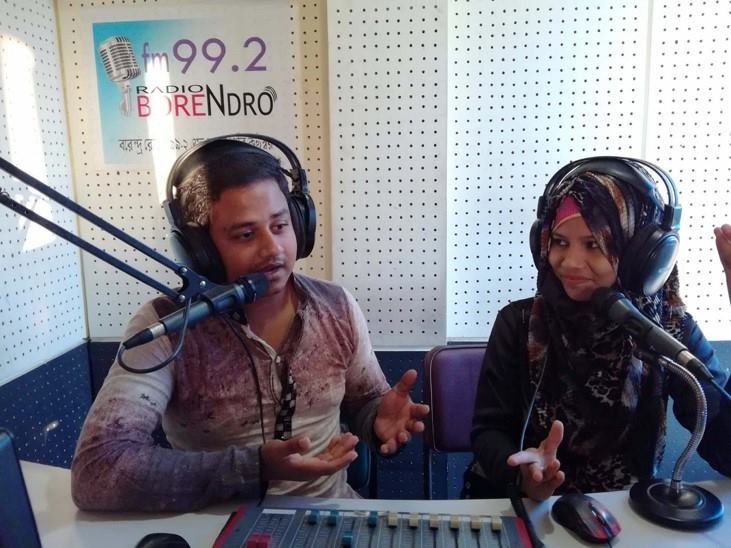Democracy International partner Bangladesh NGOs Network for Radio and Communication (BNNRC) hosts a radio talk show on countering the threat of violent extremism in the country’s rural communities.
Dhaka, Bangladesh – A recent series of extremist terror attacks have altered Bangladesh’s security landscape, creating new concerns for the country’s 163 million inhabitants. In response, Democracy International is working with local civil society organizations to pilot and examine the effectiveness of different approaches to counter the threat of violent extremism through our partnership with the U.S. Department of State’s Bureau of Conflict and Stabilization Operations. Our project provides a challenging, but exciting, opportunity to move from theory to practice in the countering violence extremism (CVE) field, and a way to effectively advance evidence-based programming in the sector.
While government leaders, civil society representatives, and counterterrorism experts often disagree on the drivers of radicalization and extremism, there is a general consensus in the policy community that addressing extremism requires a broad political strategy that looks beyond the security sector. While the police and military have a critical role to play, successfully countering violent extremism requires us to engage local authorities, communities, and family members to prevent, control and, ultimately, assist in the rehabilitation of those who espouse and promote dangerous ideologies. Despite the broad agreement on certain CVE tenants, turning theories into functional practice at the local level is always complex. Approaches which have yielded success in one context may be poorly adapted for another.
Hoping to build on various theories of CVE, while recognizing the challenges, we are seeking programmatic evidence for success in countering extremism through eight pilot schemes conducted in collaboration with local organizations in Bangladesh. “We’re ready to take risks. We wanted to be creative and try things out, to see what works and anticipate that we may learn as much from our failures as from our successes,” notes Colin McCIlreavy, DI’s Director of Global Security who supports our CVE program team in Dhaka.
There is considerable diversity amongst the test civil society projects. A handful are designed to facilitate social change and community engagement at the grassroots level through dialogue and messages about extremism owned and delivered by community members themselves. One group, the Bangladesh NGOs Network for Radio and Communication, is creating talk shows and public information campaigns for radio, which remains the most effective means to reach a mass audience in the most rural areas of Bangladesh.
As in other international contexts, Bangladeshi youth are considered a key at-risk group for extremist messaging and several pilot projects focus on messages development by youth for youth as well as for parents, teachers, and university lecturers. Current DI grantee Dnet is working with teachers and parents to identify behavioral changes in students and provide them with resources to better support students at home and in the classroom. In addition, Dnet has also trained parents on strategies to foster an open and inclusive environment where students feel free to express themselves.
Other approaches supported by DI harness our partnerships with local universities and technological innovations in Bangladesh’s rapidly modernizing society. PrenuerLab, for example, is digitally mapping incidents of extremism nationwide and developing tools to monitor extremist content online (including a recent hackathon). An additional initiative by the Bangladesh Enterprise Institute aims to build a nationwide networking platform for civil society organizations to share and exchange ideas on CVE.
There are many challenges to the work: these are complex, demanding, and sensitive issues. Programmatic interventions challenge existing roles, particularly concerning the responsibilities of the family and the state. The role of civil society in CVE is evolving and often uncertain. Other obstacles are more tangible, including the challenge of assembling and mobilizing communities in rural areas as well as inserting relevant CVE content into school and university agendas, already filled for students and teachers alike.
The pilot projects are still in progress with evaluations scheduled to conclude in the coming months. Despite the associated challenges of monitoring, evaluating, and implementing each project, the evidence suggests some organizations have successfully bridged the gap between theory and practice,and all benefit from an admirable level of engagement, energy, and ownership which augurs well for future CVE learning and programming in Bangladesh.
#Bangladesh # CVE #citizen security #civil society
Jan 25th, 2018
http://democracyinternational.tumblr.com/…/from-theory-to-p…


